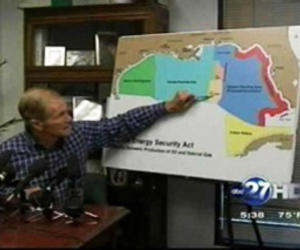Florida Senator’s bill seeks talks over oil
- Submitted by: manso
- Politics and Government
- 05 / 07 / 2011

Apparently responding to Cuba’s persistent drive towards offshore drilling, a Democratic Senator from Florida quietly introduced a bill in February that would compel the United States to seek talks with Cuba over deep sea drilling safety and spill response.
Phil Peters, a Cuba analyst with the Washington-based Lexington Institute, first reported about the bill in his Cuban Triangle blog.
A consortium led by Spain’s Repsol YPF is expected to begin exploratory drilling by October.
This is a turnaround for Sen. Bill Nelson, who introduced a bill in 2008 that would have forced the United States to drop out of a three decades old U.S.-Mexico-Cuba maritime border agreement and impose sanctions on oil executives whose companies begin offshore drilling in Cuba. Instead of trying to block any drilling, he now tries to make sure that Cuban safety standards are as stringent as those of the United States.
S 405, which seeks to amend the Outer Continental Shelf Lands Act, would sanction oil companies only if they don’t submit evidence to the U.S. government of a Cuban oil spill response plan and proof the company has sufficient resources for a cleanup effort, ”as determined by the Secretary” of Interior. At the same time, the bill would compel the United States to seek “a joint contingency plan with the countries of Mexico, Cuba, and the Bahamas to ensure an adequate response to oil spills located in the eastern Gulf of Mexico,” within 180 days after the amendment is enacted.
Nelson’s bill will likely split the Florida delegation in the U.S. Congress. Nelson, who has always worked in close coordination with the anti-Castro caucus in the past, can expect opposition from the three Miami House representatives and the other Florida Senator, Marco Rubio. The bill has been referred to the Senate Energy and Natural Resources committee.
Analyst Phil Peters, a harsh critic of Nelson’s 2008 bill, praised the senator’s new measure.
“Senator Nelson’s new bill seems to be driven by two realities: the drilling will proceed whether we like it or not, and if there is an emergency, an immediate and effective response depends on advance planning and agreements,” Peters wrote in his blog. The bill “amounts to a prod to the Administration, whose Interior Department simultaneously seeks to create a ‘gold standard’ for Gulf environmental protection, is concerned about Cuba drilling, is talking to Repsol, and finds the idea of talking to Cuba ’tricky’.”
Source: www.cubastandard.com/2011/05/06/florida-senators-bill-seeks-talks-over-oil/
Comments